Ecommerce is no longer just a trend, it’s the foundation of modern retail.
With global ecommerce sales projected to exceed $6.65 trillion by 2025, it is critical to choose the right website builder for success.
Your ecommerce platform directly influences sales performance, SEO visibility, mobile user experience, checkout conversion rates, and long-term scalability.
Our team of ecommerce experts has spent over 90 days testing 15+ ecommerce platforms to bring you this guide.
We have built real stores on the builders that we have chosen to test. And audited each builder based on technical performance, SEO capabilities, design flexibility, and business tools.
This guide is 100% independent. It’s crafted for entrepreneurs, small businesses, and growing brands that need real-world functionality and proven scalability.
After lots of testing and side-by-side evaluations, we found that Wcart is one of the best ecommerce website builders ever.
Here’s exactly why it stands out from the rest.
How We Evaluate These Platforms
At Wcart, we take ecommerce seriously. As a team of professionals who have spent years helping businesses launch, scale, and refine their online stores.
Our evaluation process is not based on surface-level comparisons. It consists of real-world testing, performance metrics, user feedback, and long-term business impact.
Each website builder in this list was tested using six critical criteria:
- Ease of Use
- Sales & Ecommerce Features
- Design Quality & Customization
- Marketing & SEO Capabilities
- Value for Money
- Customer Support & Community Trust
Our team also ran real store simulations with different platforms including Shopify, Wix, and Squarespace. We don’t just run any lab tests.
This research provides you what matters most to entrepreneurs and store owners, not just big brand names or marketing claims.
Read more: Essential Ecommerce Website Features
Top Ecommerce Website Builders
- Wcart – Best all-in-one ecommerce platform(Our Top Pick)
- Shopify – Best for scaling fast
- Wix – Best for brand-focused stores
- Squarespace – Best for services and portfolios
- Hostinger – Best for side hustles
- GoDaddy – Best for social-first selling
1. Wcart – Best All-in-One Ecommerce Website Builder
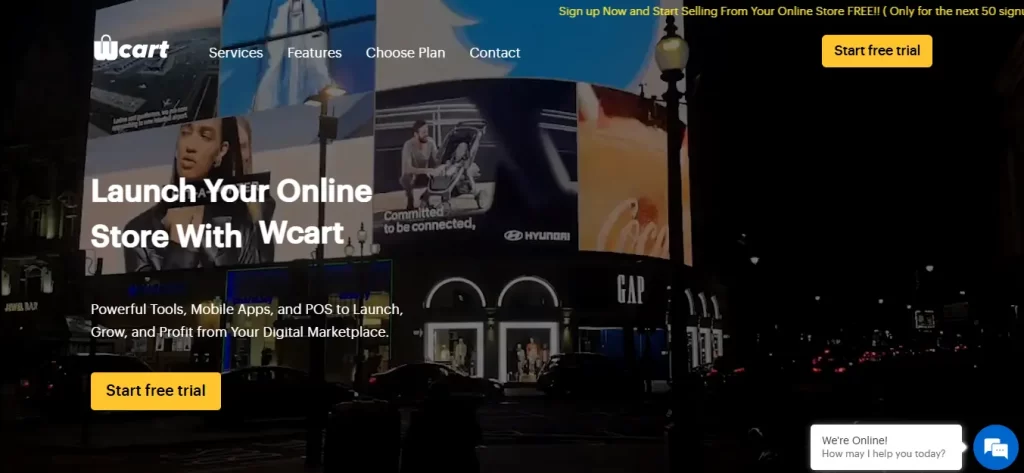
Wcart is our #1 ecommerce platform. It ranked highest in site performance, customization flexibility, SEO depth, and built-in growth tools.
Compared to other traditional builders that depend heavily on third-party plugins, it combines the power of headless commerce with the simplicity of a drag-and-drop builder.
It’s best for businesses that want full control over design and functionality. Also it never compromises on speed or scalability.
Actually it is best for businesses of all sizes. From entrepreneurs who need to start their brand new online store to brands that are looking for enterprise grade performance can go with Wcart.
Key Features
- Headless Commerce Built-In
- Visual Storefront Editor
- PWA & Mobile-First Optimization
- SEO & Marketing Tools Built-In
- Multilingual & Multi-Currency Support
- Smart Product Catalog & Inventory
- Integrated Blog & CMS
- Real-Time Analytics Dashboard
- Enterprise-Grade Security & Hosting
- Built-In Developer Toolkit
How Much Does Wcart Cost?
- Small Store – $30/month
- Boutique – $89/month
- Super Store – $689/month
A 14-day free trial(no credit card required) is also available with no hidden fees.
Why We Ranked Wcart #1
Wcart stands out for its rare combination of:
- Developer control + no-code simplicity
- Future-proof architecture with headless and PWA baked in
- Native tools for SEO, analytics, and content without plug-ins
- Global readiness for brands that want to scale fast
- Built-in support and onboarding guidance from real ecommerce experts
For anyone serious about building a modern, high-converting online store, Wcart is the smartest investment in 2025.
2. Shopify – Best for Scaling Your Store

Ideal for businesses who need to scale fast. Shopify is one of the most trusted names in ecommerce with lots of stores being built through their platform.
It’s a good choice for businesses that need powerful sales features and a vast app ecosystem.
Real strength of the platform lies in how well it handles growth, from small startups to multimillion-dollar brands.
However, many of Shopify’s advanced capabilities require third-party apps and custom development. That may add to your costs over time.
If you need full control, Wcart is the only option but Shopify remains as a top option for fast growing brands.
Key Features
- Scalable Infrastructure
- Multi-Channel Selling
- Extensive App Store
- Themes & Customization
- Abandoned Cart Recovery
- POS Integration
- Global Selling
- Analytics & Reporting
- Security & Hosting
How Much Does Shopify Cost?
- Basic – $39/month
- Shopify – $105/month
- Advanced – $399/month
Shopify also offers a 3-day free trial (with an extended $1/month deal for the first 3 months on some plans).
Note: Extra costs may apply for themes, apps, or third-party integrations.
Tired of Shopify?
3. Wix – For All-in-One Brand Building
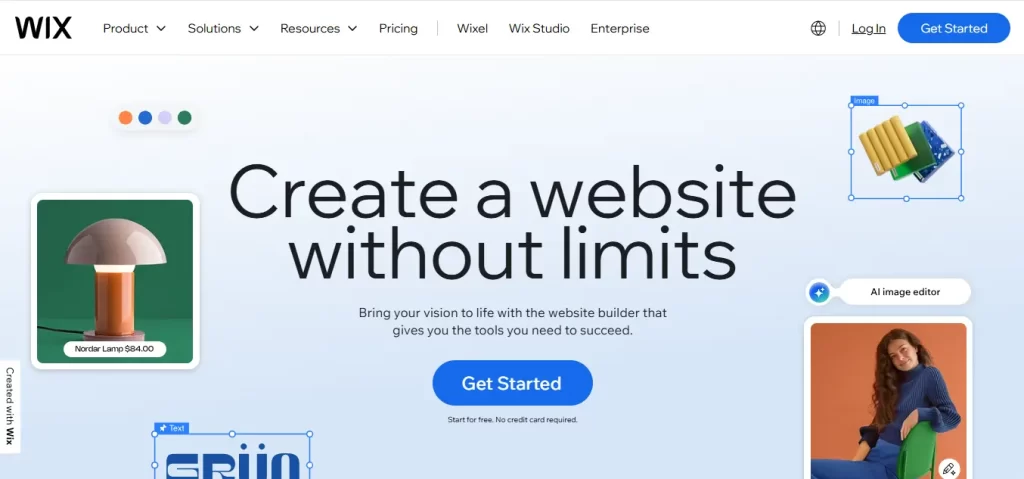
Wix is best for small businesses and creative entrepreneurs to launch an online store and establish a professional brand presence without writing any code.
It offers one of the most flexible website builders, combining ecommerce functionality with robust design freedom, built-in marketing tools, and an intuitive drag-and-drop editor.
Wix may not scale efficiently as Wcart or Shopify but it’s a solid choice for businesses focused on branding and storytelling.
If your idea is to build a lifestyle brand, online portfolio or boutique store, it is one of the best options.
Key Features
- Drag-and-Drop Store Builder
- Built-In Marketing Tools
- Hundreds of Templates
- Wix App Market
- Secure Online Payments
- SEO Assistant
- Blog & Content Tools
- AI Product Descriptions & Design Tools
How Much Does Wix Cost?
- Light – $17 per month
- Core – $27/month
- Business – $32/month
- Business Elite – $159/month
Wix offers a 14-day money-back guarantee on all premium plans, with no hidden fees. Custom domains and hosting are included in every plan.
Tired of Wix?
4. Squarespace – For Selling Services and Visual Brands

Squarespace is specially for creatives, consultants, and service-based businesses that need a visually impressive online presence with light ecommerce functionality.
Squarespace provides you some of the most beautiful templates on the market to showcase portfolios, service packages and personal brands.
It doesn’t have many features like Wcart or Shopify for large product catalogs or backend customization. It shines in storytelling, scheduling and client bookings.
If your business revolves around content, design, or personalized services, this platform is a strong choice.
Key Features
- Award-Winning Templates
- Built-In Appointment Scheduling (Acuity)
- Portfolio & Blogging Tools
- Digital Product Sales
- Integrated Email Marketing
- Custom Checkout & Donations
- SEO-Ready
- Analytics Dashboard
How Much Does Squarespace Cost?
- Business – $23/month
- Commerce (Basic) – $28/month
- Commerce (Advanced) – $52/month
Squarespace offers a 14-day free trial with no credit card required. Domains and hosting are included in all plans, and there are no transaction fees on Commerce plans.
Tired of Squarespace?
5. Hostinger – For Side Hustles
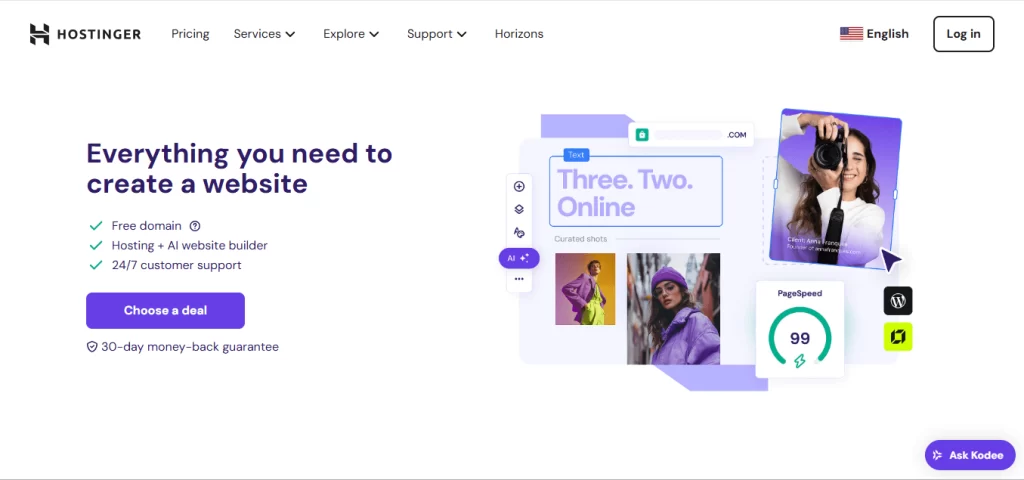
Hostinger is a smart entry point for individuals who are first for ecommerce or side projects with low overhead.
Primarily known for its reliable web hosting. This ecommerce builder is a newer initiate in the market and it’s surprisingly capable, especially for those who value simplicity and affordability over deep customization.
You can create a small online store, digital product shop, or niche brand on a tight budget. Not a scalable one.
Hostinger offers a clean and cost-effective way to get online fast, even if you have no technical experience.
Key Features
- Simple Onboarding & Setup
- Affordable Hosting & Free Domain
- Built-In Marketing Integrations
- Multi-Payment Support
- Basic SEO & Blogging Tools
- Mobile-Optimized Templates
- SSL & Security Tools Included
How Much Does Hostinger Cost?
- Premium Website Builder + Ecommerce – $3.49/month
This is one of the lowest-cost options on the list, making it ideal for side hustlers, solo entrepreneurs, or test projects. There’s also a 30-day money-back guarantee if you’re not satisfied.
Read more: Ecommerce Payment System Importance
6. GoDaddy – For Social Media Promotion
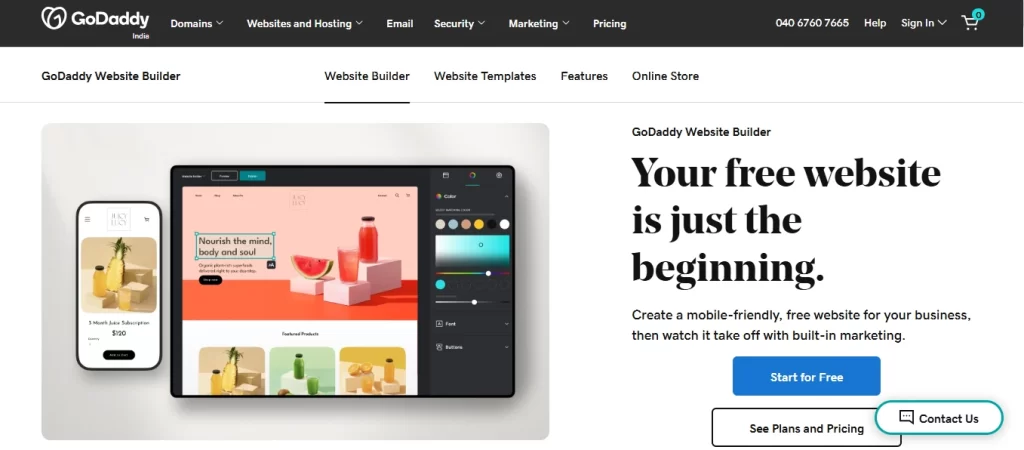
You all know GoDaddy as domain registrar but unfortunately they too have an ecommerce website builder for entrepreneurs who are willing to sell their products primarily through social channels.
Its strength lies in easy store setup and instantly connecting products with Facebook, Instagram, and marketplaces like Amazon or eBay.
GoDaddy offers speed automation and omnichannel marketing tools that suit small businesses and dropshippers.
Key Features
- Social Selling Integrations
- AI-Powered Site Builder
- Marketing Automation
- On-the-Go Store Management
- Flexible Payment Options
- SEO, Blogs, and Appointments
- 24/7 Support
How Much Does GoDaddy Cost?
- Basic – $9.99/month
- Premium – $14.99/month
- Commerce Plan – $20.99/month
All plans come with a free trial and 24/7 live chat support, with no hidden fees or transaction charges.
Read more: How to make an ecommerce website with online store builder?
Other Ecommerce Website Builders to Consider
Besides the main platforms we covered, there are a few more options that might fit your business:
- BigCommerce — Best for growing businesses that need strong built-in features and scalability.
- Weebly — Easy to use and budget-friendly, good for small or hobby stores.
- Magento (Adobe Commerce) — Highly customizable, best for large enterprises with technical resources.
- Ecwid — Great for quickly adding an online store to an existing website or social media.
These options offer different strengths and could be a better fit depending on your goals. If you are new to ecommerce, check out our guide on How To Start An Ecommerce Business? Tips And Tricks to build a strong foundation.
Read more: BigCommerce Alternatives: Why Brands are Switching to Wcart?
How to Choose the Right Ecommerce Website Builder
The best platform depends on your business model, technical comfort level, and how you plan to sell. We have broken it down on the basis of types of ecommerce.
For Beginners, Creatives, and DTC Startups
If you are a beginner and new to ecommerce, choose builders with drag and drop features, great templates and all in one tools.
Best choices: Wcart, Wix, and Squarespace
For Dropshipping or Digital Product Stores
Look for platforms that allow automated inventory syncing, seamless supplier integration, and flexible digital delivery.
Best choices: Shopify, Wcart, and GoDaddy
For Local Businesses and In-Person Service Sellers
You will be specifically in need of features like appointment booking, service listings, and local SEO tools.
Best choices: Squarespace, GoDaddy, and Wcart
No matter your business model, the right ecommerce builder should save you time, scale with your growth, and offer support when you need it most.
Relevant read: How To Choose The Best Online Store Builders
Final Verdict: Which Builder Is Right for Your Store?
Our top ecommerce website builder for 2025 is Wcart. It is easy of use, works well for small businesses, and can grow with your store.
But the best builder for you depends on what you need.
- If you want many tools and features, Shopify is a good choice.
- If you want to control how your website looks, try Squarespace.
- If you want to save money, Hostinger is a great place to start.
Once you pick the best builder, you can start your store and help it grow!
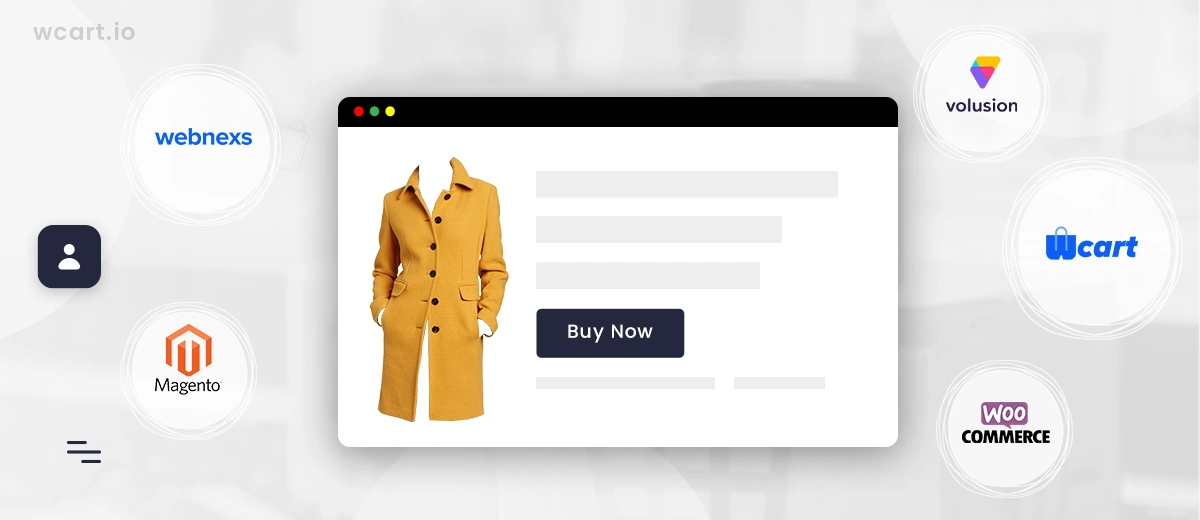



Leave a Reply